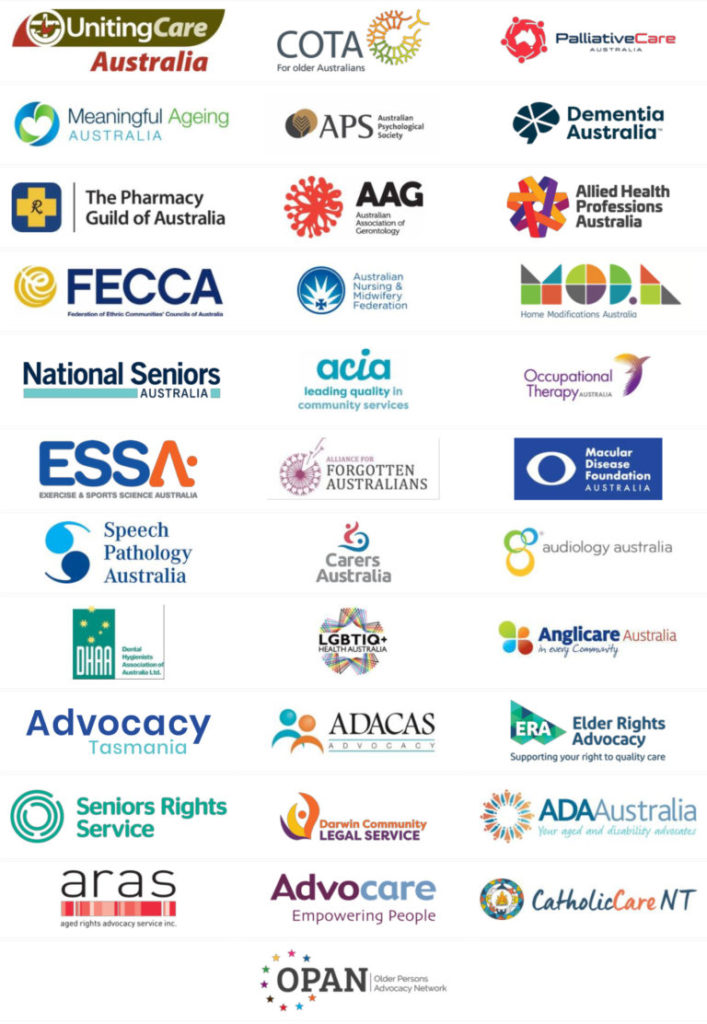
Seniors Rights Service joins OPAN and a coalition of organisations to call on the Australian Government to commit to, and implement, an Aged Care Act that embeds the rights of older people within the Act in order to truly transform the aged care system. We place on the public record our support for a Rights-Based Act. The first recommendation of the Royal Commission into Aged Care Quality and Safety Final Report was a new Aged Care Act, specifically a rights-based Act. Placing this as the first recommendation highlighted the importance and centrality of this new Act to truly transforming the current aged care system. It also emphasised the importance of placing the older person, and their rights, as ‘central’ to aged care. The following two recommendations provided greater detail on the rights and principles for this Act, though older people are saying that many of the principles should, in fact, be rights.
We propose that the rights listed in Recommendation 1- A new Act and Recommendation 2- Rights of older people receiving aged care need to be expanded on to ensure an extensive range of rights are adequately captured. For example, we suggest the following rights are included in a rights-based Act:
- the right to services being available in a timely manner, integrated with the community, to be locally available and to be in the least restrictive environment.
- the right to liberty, freedom of movement, and freedom from physical and chemical restraint.
- the right to have diversity supported and promoted.
- the right to a quality end of life – with appropriate and timely access to palliative care supports and expertise.
- For people providing informal care, the right to access supports in accordance with needs and to enable enjoyment of the rights to social participation.
In addition, many of the principles in Recommendation 3 – Key Principles should be incorporated as rights within the Act.
The Government in its response to the Royal Commission stated that they accept Recommendations 1 to 3. However, the language of rights has not been prominent in any discussions on the Act. Instead, there has been reference to a “consumer-focused Aged Care Act” and discussions on “values and principles”.
The existing Charter of Rights for service users of aged care is limited by the current system and by its lack of enforceability. As a result, the system is not rights-based and, does not have the resources and structures in place to ensure the rights of older people are upheld, despite Quality Standards that outline many rights-based obligations. This creates a significant barrier for the full realisation of the rights listed in the Aged Care Charter of Rights and has resulted in the Charter not being fully implemented.
The human experience of older people must be the central focal point of the new Aged Care Act. Older people must be able to exercise choice about their lives and to be treated as individuals and citizens; this is paramount to delivering a reframed aged care sector. To this end, older people themselves must be involved in a co-design process for the new Act to ensure that it truly reflects their rights.
We believe that a human rights-based aged care act is essential, as only then can the rights, preferences, and needs of the older person be at the core of the aged care system. It is imperative that this Act is backed by an aged care system that enforces, enables and protects the rights of older people as well as recognising and supporting their families and carers. This must also include having an enabled workforce with the right numbers and skill mix to meet the needs of an older person.
A new rights-based Aged Care Act must include mechanisms for monitoring and enforcing the rights of older people and there must be consequences for breaching these rights. The governance model of aged care must reflect this with appropriate mechanisms to monitor, respond and ensure the rights of older people are upheld. This must include direct engagement with older people themselves and the organisations and people that represent them.
Rights must be framed to support active, informed and empowered citizenship for older people. This includes the right to equitable access and outcomes, the right to exercise choice, the right to autonomy, the right to the presumption of legal capacity, and in particular the right to make decisions about their care and the quality of their lives and the right to social participation and enjoyment as well as the right to fair, equitable and non-discriminatory treatment in receiving care.
The rights contained within the Queensland Disability Services Act (2006) are a stronger framing of the rights of the individual and the expectations of embedding those rights as service principles.
The human rights approach to aged care will require a revised approach to understanding the Charter of Aged Care Rights. The current Charter should not be lost, but should be enforceable, have penalties for breech, and should have local and systemic oversight and reporting mechanisms.
We must develop and deliver a rights-based aged care system, where rights are embedded in legislation that respects, protects and enforces the rights of older people.



